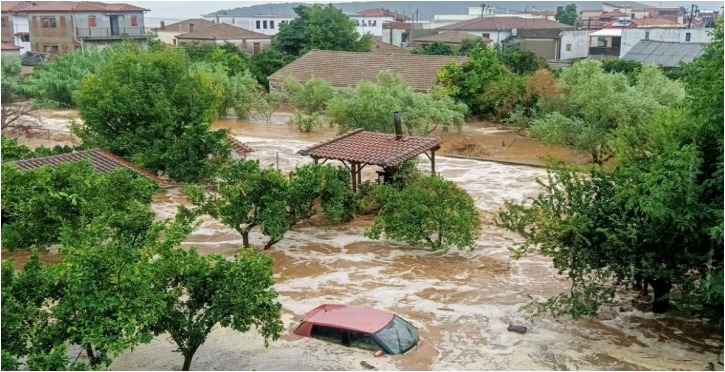
Intense rainfall has unleashed chaos in Greece, resulting in widespread flooding, road closures, and a tragic fatality following a wall collapse, all triggered by severe weather conditions brought on by Storm Daniel. This natural disaster struck both western and central regions of Greece, prompting a significant surge in emergency calls as residents grappled with the flooding, which occurred shortly after the containment of a deadly wildfire that had ravaged northern Greece for over a fortnight.
One particularly devastating incident involved the collapse of a wall near Volos city, which tragically claimed a man’s life. The victim, a cattle breeder, met with this unfortunate end while attempting to reach his animals amid the deteriorating weather conditions. In another harrowing event, a man in Volos is currently missing after his vehicle was swept away by the powerful rainstorm. Although his son managed to escape from the car, the father was carried away by the relentless currents, prompting an ongoing search and rescue operation.
To contend with the aftermath of this severe rainfall, authorities have taken the necessary step of imposing traffic restrictions across the broader Volos area. Greece has previously endured the devastating consequences of flash floods, most notably in 2017 when such an event resulted in the loss of 25 lives and left hundreds without homes, underscoring the nation’s vulnerability to extreme and sudden natural disasters of this nature.
This recent episode of severe weather serves as a stark reminder of the susceptibility of certain regions to such abrupt and intense natural occurrences. It emphasizes the crucial importance of preparedness, the development of resilient infrastructure, and the implementation of effective safety measures to mitigate the far-reaching impacts of such emergencies, particularly in areas prone to flooding and other weather-related hazards.
In addition to the immediate humanitarian concerns, this event raises questions about long-term strategies for disaster resilience in Greece. With climate change contributing to more frequent and severe weather events, the nation must continue to invest in measures that enhance its ability to cope with such emergencies. This includes improving flood defenses, implementing effective early warning systems, and conducting public awareness campaigns on disaster preparedness.
Furthermore, local and national authorities should consider zoning regulations and urban planning that take into account the risks posed by extreme weather events. Ensuring that infrastructure and housing developments are built with resilience in mind can significantly reduce the impact of future disasters.
As Greece grapples with the aftermath of Storm Daniel, the nation is reminded of the importance of vigilance in the face of climate-related challenges. By learning from each weather event and taking proactive measures, Greece can build a more resilient and safer future for its citizens. This experience underscores the need for a comprehensive approach that involves not only emergency response but also forward-looking policies and investments in disaster resilience.
